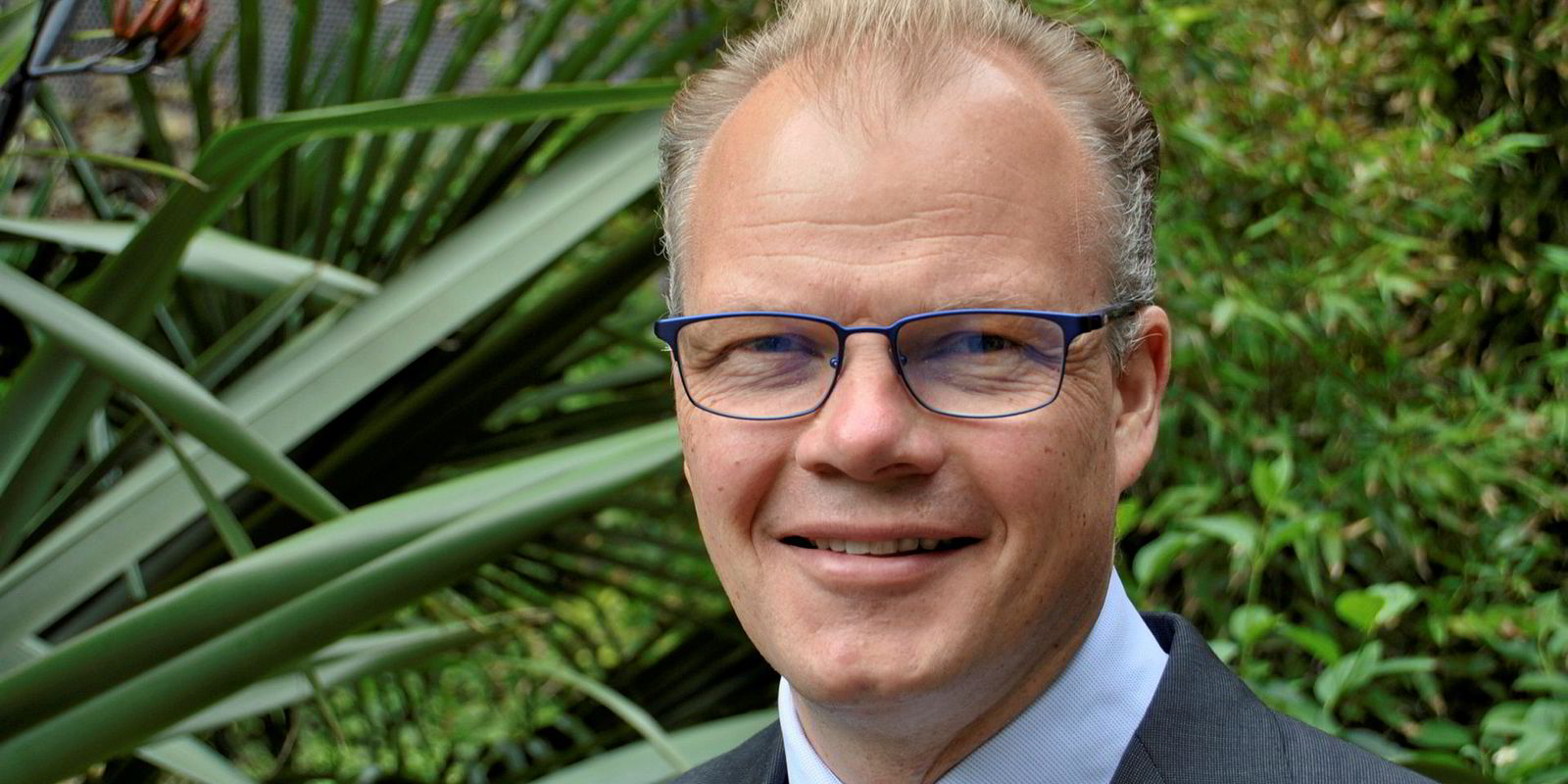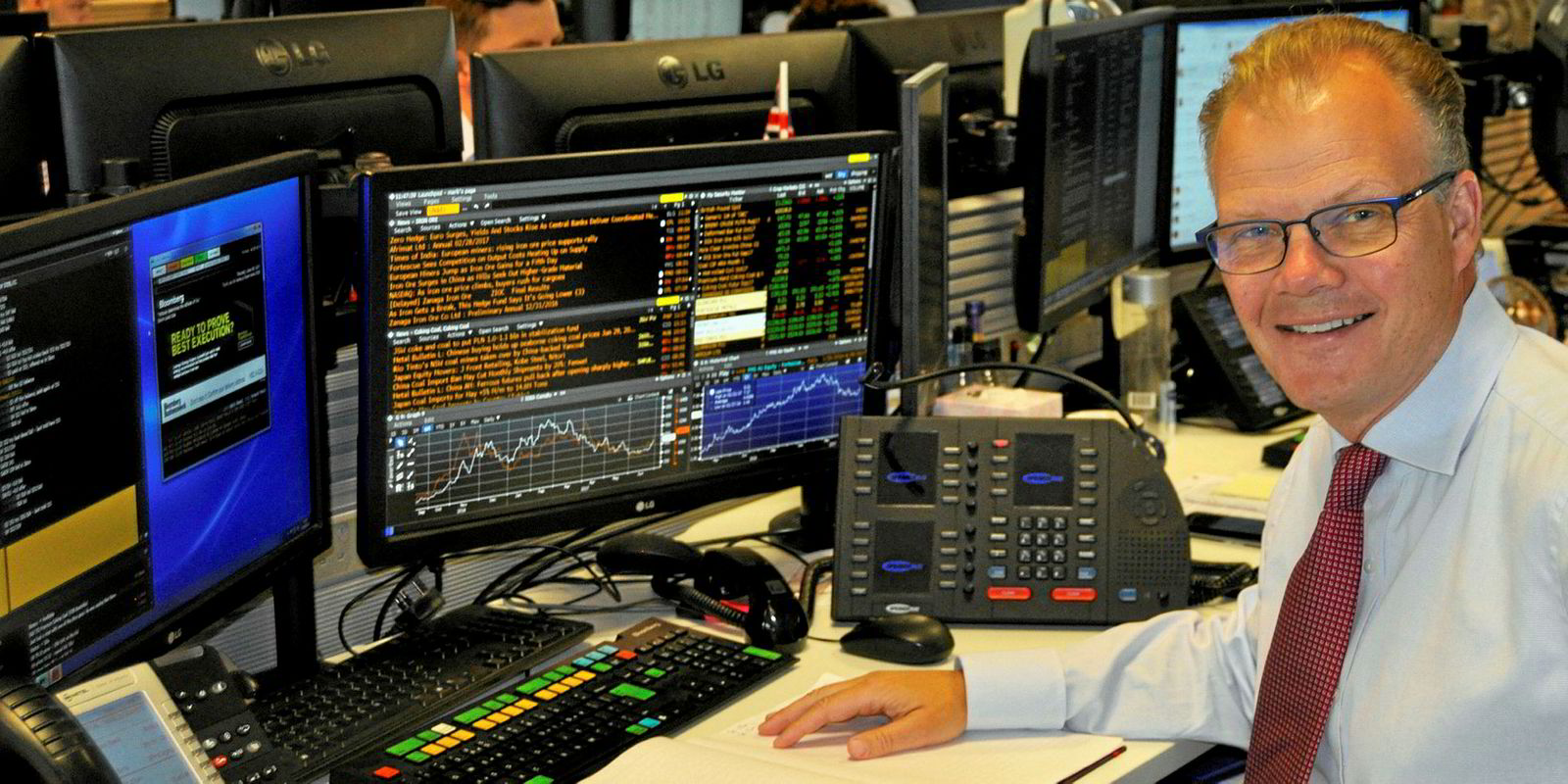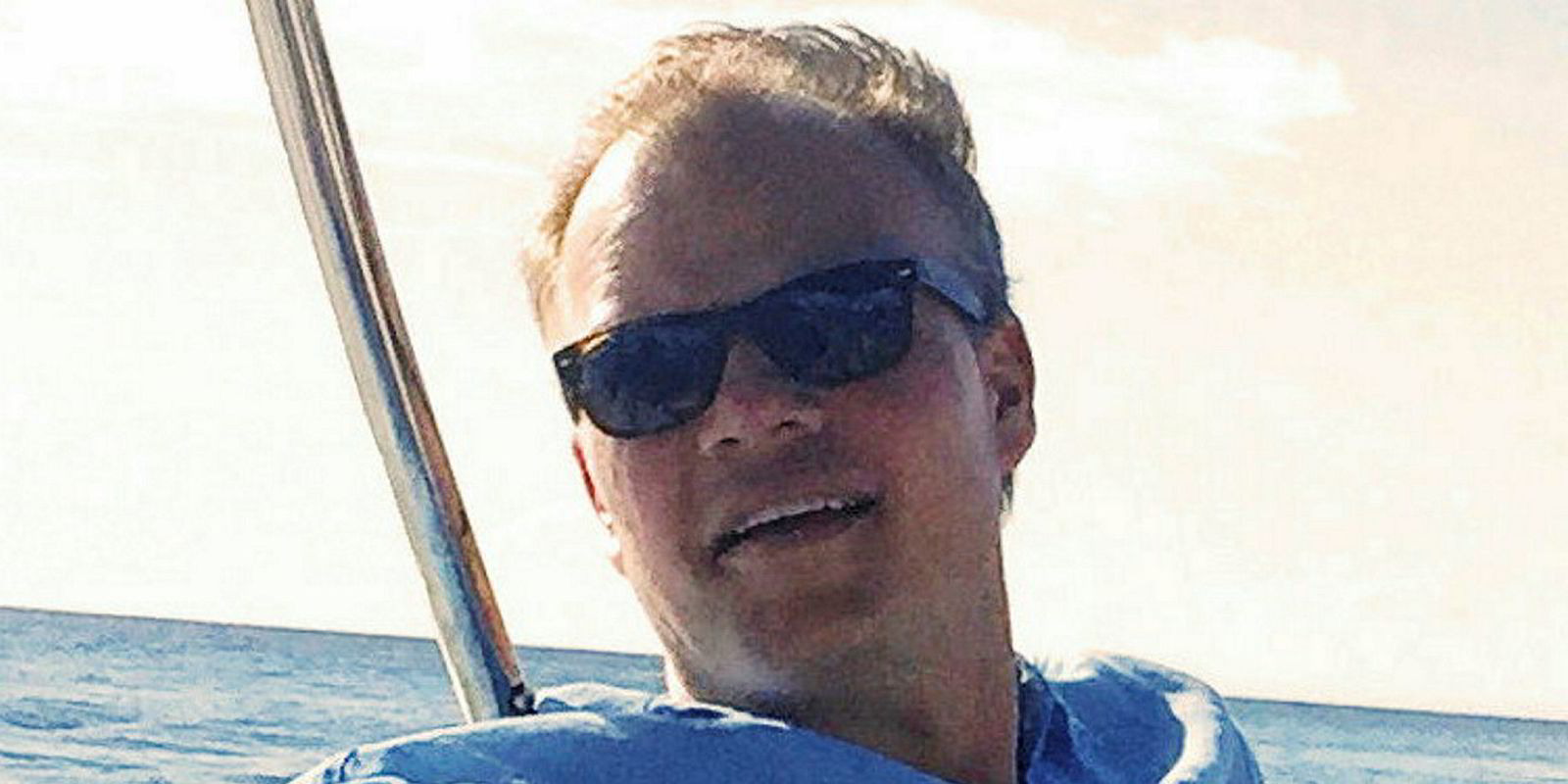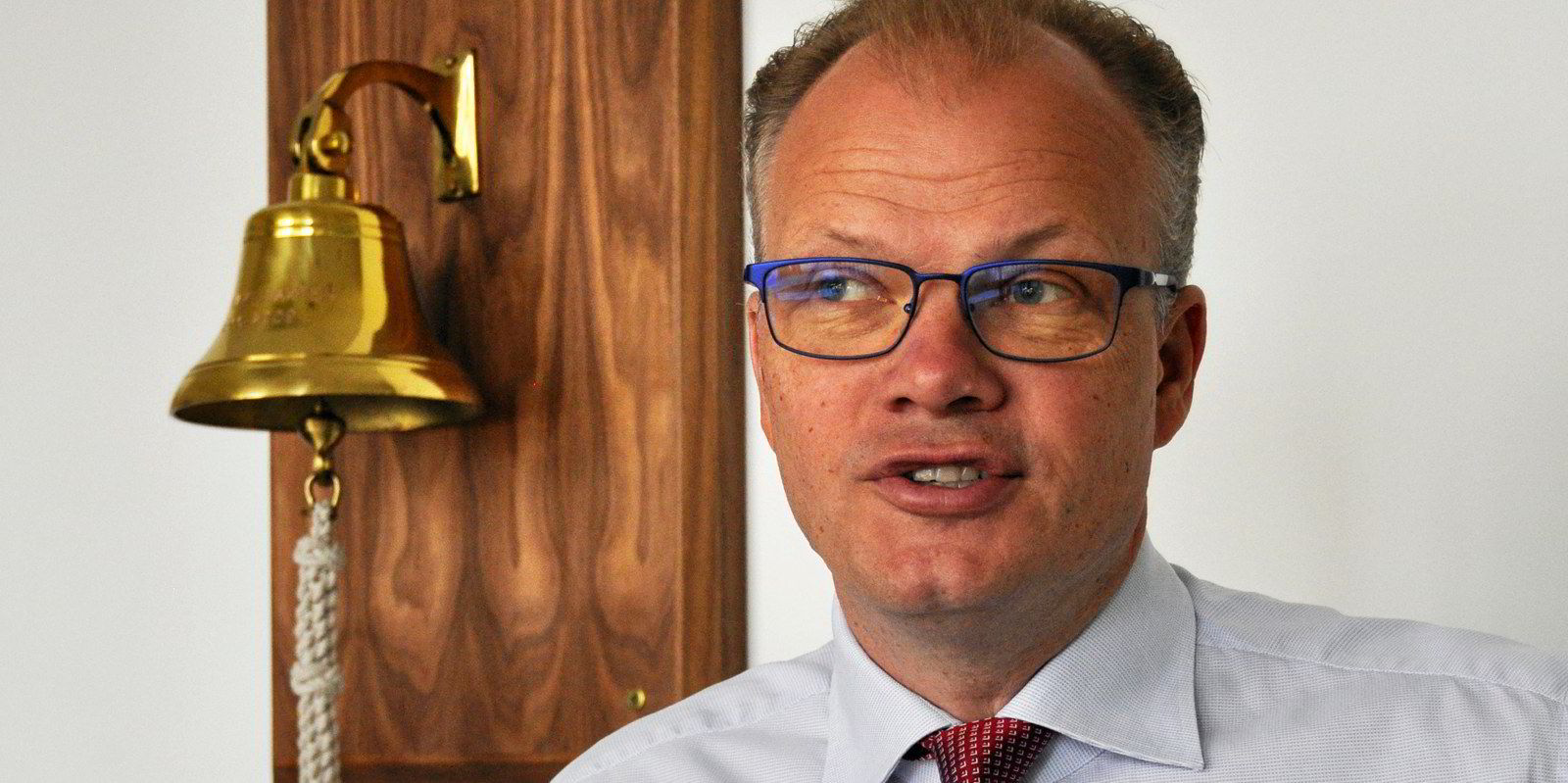New Simpson Spence Young (SSY) chairman Mark Richardson has a vision, and it has shipbroking skills at its heart.
Richardson, 52, who took over the top job at the 400-strong broker on 1 January, is widely perceived as having been successful in building its forward freight agreements (FFAs) business. While he acknowledges the blueprint for this will not fit all, he is keen to apply elements of this model to other parts of the company.
Key to what the firm’s FFA brokers have achieved is remaining very good at their core element of “freight”, he explains.
In his new role, Richardson wants to evolve SSY’s broking to aim at higher-value business in other areas. He is targeting long-term period deals, for which the company has specifically employed dry cargo and tanker staff globally. He also believes there is scope to become stronger in sale and purchase (S&P).
Richardson flags up SSY Carnegie — the joint venture with Norwegian investment bank Carnegie — as an attempt to break into the financial side of the business as well as an example of a way to give another dimension to the S&P desk.
The latest edition of TW+ is out now. Click here to read the magazine.
“You’ve got to be able to look a big client in the eye and say: ‘This is how I’m going to help you and this is the difference between me and the rest of the herd’,” he says. “We’ve always been a very good shop at these things but we can really aim higher and I think part of my job is to assist that process.”
Richardson also wants to strengthen SSY’s core by bringing in more non-cyclical and counter-cyclical businesses — like the company’s existing agency and towage arm — to contribute revenue whether markets are up or down, and add value to other core activities.
He is keen to have early involvement in evolving sectors such as gas, an area SSY wants to focus on as part of moves to expand its green-energy business.
Richardson also plans to look at opportunities for developing new business from existing activities, as SSY has already done by putting its research data online through its Premier Club initiative.
“I really want to try to add value, but add a greater value than maybe traditional broking has done historically,” he says. But he is clear that it all has to be built around the existing marine and shipping base, with shipbroking remaining at the core.
Richardson was unanimously voted in as chairman by the 28 partners in SSY’s private partnership structure last year.

To some company outsiders, especially those in the wet markets who might not have crossed his path on his rise to FFA fame, his appointment may have come as something of a surprise.
Several have commented that it marks a distinct change from his predecessor, the ebullient and larger-than-life John Welham, who can still be seen hard at work in the adjoining office as a consultant for SSY. But insiders say Richardson played a deft hand in positioning himself as top pick for next chairman.
So did he want the top job? “Absolutely,” he replies. “I do think it is the pinnacle of a career.”
While accepting that he might be better known for his work on derivatives, he strongly rejects one industry observation that he is “not a shipping man”.
“I don’t think anybody knew me as the guy that was fixing Russian tweendeckers out of Peru, or even a panamax broker in the early days of Noble and trading out of Hong Kong,” he says.
The new chief is now an old SSY hand after spending 15 years working in the London headquarters. In preparation for his new role he has visited all 17 of the company’s offices in 12 months to “make sure that people understand who I am, what I’m doing and that shipping is our core business. We are not suddenly revolutionising this company.”
On his travels he was pleased to see SSY brokers talking globally and sharing information. “I think one of the most damaging things is when you get a silo mentality where separate teams are not sharing contacts.”
Richardson is a fan of SSY’s private partnership structure, in which he says it is in everyone’s interests that every part of the company is as good as it can be.
“I think that that dribbles down and creates a different ethos, rather than in a larger company where other offices of the same brand might become your biggest competitor.”
“Our business is evolving very fast and it’s a very exciting time to be a shipbroker,” Mark Richardson says. “There are more ships and cargo flows than ever before, but the landscape for shipbrokers is changing and more professionalism is required from them. Brokers need to stay in control of their data and create new innovations solutions for the market.
“People have got to be agile. They need information to be well informed, and brokers to help with that. There have always been questions asked on the future role of the shipbroker, but this is important in helping markets evolve. Those brokers who will win will use all the elements available, bring this together in one central point, interpret and give advice.”
He also thinks the partnership allows SSY to grow businesses at the right pace, move quickly and take “cooler, calmer decisions”. It does not need to “dance to the tune of shareholders”, which he says can waste an enormous amount of energy.
SSY’s decision to rebrand a couple of years ago — a move driven by partner James Palmer — remains part of an ongoing process that has helped give the company a more contemporary face and recruit younger talent for an evolving and faster-moving industry, he believes.
Richardson is keen to see SSY respond to the needs of these new dynamics, including the lack of finance available to owners.
“I don’t think we’re going to see a rash of over-exuberant ordering, particularly on the dry side, because the financial structures and traditional lenders are not there.”
He is also not convinced US equity markets will return to the fray any time soon.
SSY is forecasting that 40 million dwt of dry cargo tonnage will be contracted this year, but a maximum of 30 million dwt in 2018, partly due to the lack of access to cash.
“Finance is limited and that’s why it is something that needs creative solutions to people’s situations,” he says, pointing to SSY Carnegie, which he says has not had to go looking for its first clients: “They have come to us.”
Richardson appreciates that it can be challenging for traditional shipowners to be asked to change their structure, perhaps become incorporated to create a vehicle that can go into equity markets, add new board members and relinquish some of the decision-making.
But he adds: “That’s the way the world is changing. If people want to build their business and be able to attract investment, they need to have corporate governance.”
He says owners — at least the progressive ones — now know this. “If they have the luxury of huge wealth, then they probably don’t need us. But actually, that’s not the majority — and even if they do, they probably still want to expand further, and those traditional sources of finance are not there.”
In five years, he believes many companies will be structured differently because change will have been the only way they can grow. There will be a very different financial landscape, but SSY will be part of it.

Off to a Mercurial start: Wheeling, dealing, fishmealing
Baltic Exchange chief executive Mark Jackson gave Mark Richardson his rather wheeler-dealer break into the industry at what was then Mercury Shipbrokers.
Richardson started off doing Russian barter deals with Mercury’s parent company, selling garments into the Soviet Union and receiving cheap ships in return. As an office trainee, he was expected to fix them.
He travelled to Moscow during the Soviet era and recalls working with unusual products such as fishmeal from Peru, which others would not touch because of its combustible nature. He describes it as a wonderful introduction to shipping compared to many of his contemporaries, who were being sent to the Baltic Exchange to collect tonnage lists.
Richardson studied economics and sociology before starting his working life but it was the “relationship aspect” and doing deals that drew him into shipping.
The upheaval of perestroika put paid to his Russian bartering days. With a desire to move to Asia, he took a job as a panamax broker with what was then Clarksons’ Victoria Shipbrokers in Hong Kong.
The early 1990s was an exciting time to be in Hong Kong. The market was vibrant and rates were climbing, with local players taking more vessels on period hire as cargo volumes out of China expanded.
Richardson recalls working until dawn, talking on the phone to Harry Banga, head of Hong Kong trader Noble, long after colleagues in London had gone home. He fixed Banga’s first panamax bulker into China and the relationship has endured. “He’s been a fantastic loyal client of mine for my whole career,” Richardson says.
After seven years’ hard graft and with two small children, he returned to the UK in 1998. Clarksons’ panamax desk was awash with brokers in a weak market, but fortunately chairman Gary Weston’s interest in forward freight agreements (FFAs) proved a welcome distraction and he began working alongside the early business stalwarts such as Philippe van den Abeele and Ian Bland.
FFAs at this time were “sleepy hollow”, Richardson says. “You’d be lucky to do a deal a week.” But he had his eyes on what he regarded as two top jobs — head of the FFA desk at either Clarksons or SSY — because both shops had the necessary physical base. “I felt the business was going to develop and I knew that to be in charge of one of those desks was the only way to really take it forward.”
In 2002, staff departures gave Richardson a lucky break into his dream job at SSY. That year China awoke and the FFA market started motoring. One of his first moves was to shift the FFA desk into the middle of the broking floor, the better to talk to the physical brokers. “I knew that we needed to be very strong from a shipping base,” he says.
SSY Futures had just three inexperienced brokers battling bigger rivals. “We had to raise our game,” he admits. Richardson was also slightly scared, which he believes is no bad thing. “If you’re nervous about holding your position and where your market is going, then you stay on your toes.”
Today, SSY Futures boasts 30 brokers covering freight iron ore, coking coal, steel, scrap, rebar and aluminium.

Forward thinking: ‘Plan, but be ready to adjust’
Despite the demands of his new job, Mark Richardson likes to keep his hand in on forward freight agreements (FFAs).
He misses the day-to-day business a little, which is now handled by other Simpson Spence Young partners, but is still trading on behalf of a few personal clients to keep himself “sharp first thing in the morning”.
As chairman, he is travelling much more and speaking. He has had some useful training in this as he pushed to expand the firm’s FFA business by getting out to conferences and industry gatherings to meet and find new clients with physical exposure to commodities they were looking to hedge.
Those who work with Richardson describe him as “organised, successful and practical”. The man himself has a slightly different perspective. “I’m quite restless,” he admits. “I am constantly looking for what’s next.”
What he really enjoys is studying new things and throwing himself into them. He did this when he became chairman of the FFA Brokers Association, a job he took slightly earlier in life than he perhaps should have, partly to push himself onto a steeper learning curve. “I was very keen to really embrace the whole world and try and understand how this market was going to develop.”
He is, he thinks, inquisitive, always on the look-out for how things are going to change — and quite calm. “I think you need to be cool under fire because what’s great about this business is events. We all map out scenarios of what’s going to happen in the marketplace, but events change everything and that’s what keeps things interesting. Planning is good, but you have to be agile and be able and willing to adjust.”
Outside the office, he is getting into sailing again. He used to own a yacht in Hong Kong and has competed in the Around the Island event there, as well as a South China Sea five-day race to Manila. He would love to do a transatlantic or transpacific passage but is unlikely to be able to carve out the time right now.
The elder of his two sons (who share the same birthday) is doing his Royal Yachting Association competent crew qualification, and father and son are busy planning expeditions. And there is more sport in the Richardson household, with his younger son proving something of a star bowler at cricket.
Family life keeps Richardson busy and he enjoys watching his lad play cricket most weekends. He recounts getting off a 14-hour flight from Singapore, snatching two hours’ sleep and driving another couple of hours to see his boy get three wickets. “That was my perfect day and I was just so pleased that I did it,” says the proud dad.




